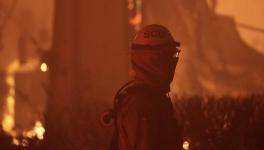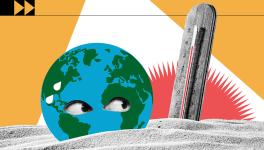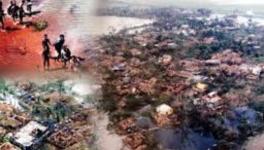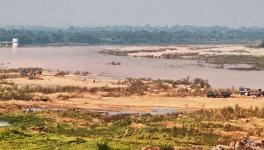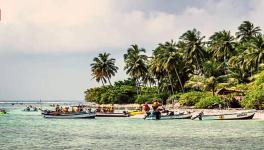X-Press Pearl Disaster Offers Lessons for Moving Chemicals on India’s Waterways
Image Courtesy: Reuters
MV X-Press Pearl, the blazing cargo ship stranded in the Laccadive Sea off the coast of western Sri Lanka, is sinking. Authorities had been trying to tow the ship further into the sea to prevent pollution near the coast, but the damage is already done – both at the coast and in the sea.
With dead animals washing ashore and fish consuming the micro-plastics, the scale of the disaster and its ramifications for the environment, human health and livelihoods dependent on fishing are set to be widespread
The ship, laden with 25 metric tonnes of Nitric acid, was on its way to Singapore from Hazira port in Gujarat when it caught fire. A possible explanation is that there was an acid leak which caught fire when it rained since the chemical reacts with water. Nitric acid is also toxic when it burns. So, there are fears of air pollution too.
Other cargo included chemicals like ethanol, caustic soda, plastic pellets and about 300 tonnes of oil. All such items now litter Sri Lanka’s beaches and manifest as pollution in the Indian Ocean.
“Initially, the assessment was that the disaster could be contained. But there was an explosion and our beaches started getting polluted,” said Muditha Katuwawala, Coordinator, The Pearl Protectors, a youth-led marine conservation organisation based in Sri Lanka. Katuwawala also noted that people who touched the debris and who went into the polluted waters have developed skin rashes.
"In the next few weeks, beaches in Goa and Tamil Nadu can also be polluted because currents of the south-west monsoon can move toxic materials [in the direction of these states],” Katuwawala added.
The lesson here though is one of precaution because a clean-up is impossible. Katuwawala explained that one possible reason why the fire went out of control could be that the crew used water to try and douse the flames. This is not advisable because the ship had Nitric acid as cargo. On the contrary, simple measures like using sand to fight the fire would have helped.
“It is important that details about the accident gain [public] attention because it would reveal the sort of issues that lead to accidents,” said Avli Verma, a researcher with Manthan Adhyayan Kendra. She noted that uncertainty is not entirely avoidable but that there could be systems in place that allow us to prepare for disasters.
The major takeaway from the disaster is ensuring that safety standards are adequate and are actually implemented. This is where India has lessons to learn.
Lessons on Moving Chemicals via National Waterways
According to 2019-2020 data by the Ministry of Ports, Shipping and Waterways (MoPSW), chemicals comprise 99% of the cargo composition of freight traffic along National Waterways 3 (NW-3). This is a 205-km stretch in Kerala from Kollam to Kottapuram. The majority of cargo comprises liquified ammonia gas, rock phosphate, sulphur and phosphoric acid.
MoPSW also states that cargo movement of chemicals has shown a "significant increase continuously from 2014-15 onward.”
“If we don’t take safety precautions and learn from the Sri Lankan disaster, such disasters can happen in India too,” Verma said.
The other route to keep track of for the movement of chemicals is NW-73 in Gujarat along the Narmada. On this route, 90% of cargo comprises Ethylene. Additionally, a 2020-21 annual report by MoPSW, also notes that the route is mostly run by private entities.
“How do you regulate safety guidelines if the waterway is run by private companies? Who does the risk assessment?” Verma asked.
All such issues are particularly relevant now given ambitious projects like Sagarmala. As of September 2019, a total of 121 projects which cost Rs 30,228 crore have been completed and 201 projects worth Rs 3,09,048 crore are under implementation.
Cross-Border Collaboration Need of the Hour
Reports mention that the ship was denied entry into India and Qatar when the leak was identified. The question here is about who shares responsibility? Do all countries along the shipping route have a responsibility? Do countries where cargo is loaded and unloaded have specific responsibilities? Or does responsibility only lie with the country where the cargo originates from?
Such questions can only be answered with cross-border dialogue and collaborations. Here too India has a responsibility to engage with countries with which it has shipping relations.
Newsclick sent a questionnaire to Mansukh Mandaviya, Minister, MoPSW, Sujeet Kumar, Private Secretary to MoPSW and Amitabh Kumar, Director General of Shipping. This report will be updated if and when a response is received.
(The author is a freelance journalist. The views are personal.)
Get the latest reports & analysis with people's perspective on Protests, movements & deep analytical videos, discussions of the current affairs in your Telegram app. Subscribe to NewsClick's Telegram channel & get Real-Time updates on stories, as they get published on our website.









